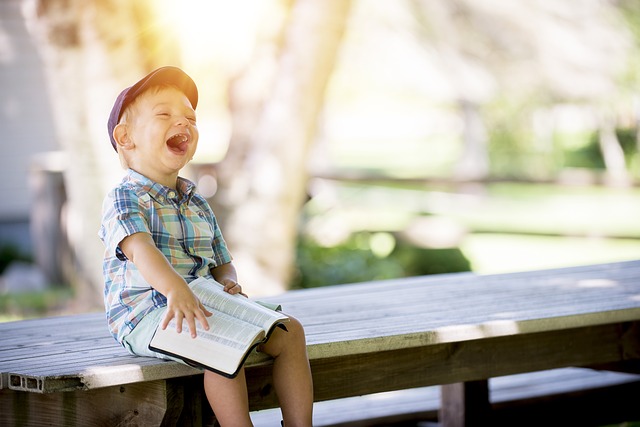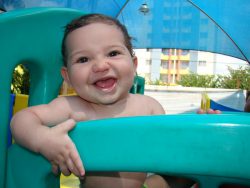He who laughs from childhood laughs best
Each of us must have heard that laughter prolongs life. However, few people know that fun and a good sense of humor are an excellent parenting tool that allows you to establish a trusting and warm relationship with a child at any age. And you can start such work from the very first months of a baby’s life.

Table of Contents
The magical power of laughter
Laughter is part of the human essence, inherent in us at the genetic level. Therefore, the first smile on the face of a newborn baby can be seen within a couple of weeks after his birth. Of course, it cannot be called a conscious manifestation of emotions – it is rather a reflex reaction, a sign that the little man is happy with everything.
But a conscious smile addressed to the mother should be expected in the second month of life. It is the first attempt at communication on the part of the baby and creates a close psychological connection between him and the adult. That is why it is so useful sometimes to tickle the little one or talk to him in a stupidly friendly tone, causing a touching giggle.
We grow up laughing
Laughter is a sign of the normal development of the baby – not only emotional, but also intellectual – and at the same time contributes to this development. A joyful smile stimulates the simultaneous work of many muscles. Thus, it activates the parts of the brain responsible for the development of intuition, imaginative thinking, imagination and creative abilities of the child. In other words, the cognitive development of the baby largely depends on the amount of positive emotions that he experiences.
Therefore, close communication that causes a smile is just as necessary for him as full care and exercise.
Funny parenting
Later, laughter and jokes can become an indispensable tool in raising a grown-up little one and a way to avoid many conflicts. Try to force the child to show the neck to the doctor if he does not want it – and you are guaranteed to fail. And if you try to play the frog and arrange a comic competition in artistic croaking? The victory will belong to the one who will publish the loudest and longest croak, while making the strict Aibolit laugh! At the same time, the mood of the little patient will rise by itself, and relations with mom or dad will become even warmer.
In the future, the ability to find comedy in difficult situations more than once will help the child cope with difficulties. Children brought up in families where laughter and jokes are welcome grow more sensitive to the grief of others; their capacity for empathy (compassion) is much higher than that of other children. With such character traits, even in adulthood, it will be easy for them to find reliable friends, which means they will never know loneliness.
Laugh to your health!
Sincere laughter affects not only the psycho-emotional state of a person. It is directly related to our physical health. It has been experimentally proven that the very expectation of watching a funny movie increases the amount of growth hormone in the body by almost 90%. This hormone is directly related to the formation of the immune system. That is why cheerful people get sick much less often than pessimists.
In addition, laughter is an effective tool in the fight against respiratory diseases. It’s all about the speed of the air that escapes from the lungs during the bursting laughter, and this is 100 km / h. In this case, the mucus accumulated in the lungs is simply pushed out, clearing the airways. Therefore, fun is especially indicated for patients of all ages with bronchitis and asthma.
The healing properties of laughter have not escaped the attention of physicians who use an unusual “medicine” to heal the sick. In a number of countries, laughter therapy is a separate area of medicine.
How laughter grows with the baby
It doesn’t take much effort to make a little one who is not even a year old laugh: he will smile sweetly if you just talk to him in a gentle voice, and just a little tickling will cause him to laugh out loud. And if the mother suddenly decides to hide behind the back of the chair for a couple of seconds and suddenly appear again, there will be no limit to the delight of the baby. The effect of surprise (if, of course, it is not frightening) is perceived by him as a witty joke.
This period is the best time for the first steps in developing a little man’s sense of humor.
The funniest things in the world in the eyes of a two or three year old are inconsistencies. Try to show him a dog and call it a duck – and you will hear enthusiastic laughter. Put on your boots and “walk” around the room – you are waiting for “unceasing applause”!
Understanding humor is a certain stage of human mental development. Thus, the reaction to jokes, corresponding to the age of the child, speaks of the normal development of his intellectual abilities.
Closer to three years, the child himself begins to show a desire to make other people laugh. Doing this at first unintentionally, he diligently notices what his words or actions cause the laughter of others and repeats them many times. Be vigilant at such moments: refrain from laughing if the child said something indecent, even if it looks comical in his mouth. Trying to please the parents, the baby can repeat the “joke” in front of strangers and put the parents in an awkward position.
By the age of four or five, the “comic” arsenal of the young humorist expands significantly: real jokes appear in it, gleaned from fairy tales that parents read to him and cartoons. That is why it is so important to carefully monitor the content of the video available to a child at this age.
Toilet jokes and other ugly topics are in full swing among preschoolers. In their attempts to make adults laugh, guys at this age can cross the line of decency, but you should not focus on this. Simply explaining that this joke is not funny is enough, and it is better not to repeat it.
And in order to teach a kid to joke correctly from early childhood, parents need only a little: learn to joke on their own and make humor a welcome guest in their home.
Home School of Humor
Many parents are perplexed, faced with the question of developing a sense of humor in a child. Is it possible to teach a person to be funny, or is it a gift that nature gives only to the elect?
Of course, temperament plays an important role in shaping the habits and character of a person, and therefore in his attitude to jokes. But a sense of humor can and even needs to be developed, and for this there is a whole range of techniques and methods available to every parent.
Laugh and joke whenever it’s appropriate
The main incentive for a child to laugh and make others laugh is the personal example of the parents. Remember the story from the Yeralash newsreel, where the boy’s parents were called to school for making his classmates laugh. Parents rushed straight from work, that is, from the performance … in clown costumes!
Of course, turning a house into a circus and a child into a clown is a bad idea, and the ability to stop in time is a skill no less important than a sense of humor. But here is the gift to feel when humor is appropriate, and the ability to use it in time is always the result of parental example.
Using kind jokes and laughing at themselves, parents teach the child not to be offended by jokes and apply them carefully, without hurting the feelings of other people.
Humor is not a joke
Take your child’s attempts to make you laugh seriously – that is, laugh, even if his humor is still clumsy and naive. As in any business, parental support is very important here for the child.
Looking for a reason to laugh
Involve your baby in activities that will make him laugh. These may be the most unexpected activities:
- funny foolish games – all kinds of “anxiety” and “tickle”;
- preparing a kindly April Fool’s joke for someone close to you;
- telling the kid a familiar fairy tale with new unexpected plot twists;
- going to the circus and funny children’s theatrical performances;
- visiting the fun room in the amusement park;
- drawing funny fairy tale characters;
- invention of new funny words;
- fun competitions during the celebration of the birthday;
- joint viewing of funny cartoons, and at an older age – and films.
When trying to teach your baby humor, remember that it is not the end goal, but only a means in the development of your relationship. The main task of each parent is to gain a sense of complete trust and mutual understanding between him and the child.
Pregnancy: there is a reason to laugh
Many expectant mothers fall into despair every time they find themselves in front of a mirror or stand on the scale. This habit does not bring them anything but bad health and the same mood. Being upset yourself, you share your mood with the baby, even before birth, developing in him a tendency to despondency.
It’s no big deal to turn a rounded tummy into an occasion for good jokes and let its resident feel that he is certainly welcome here. This approach will help to form a light and cheerful view of the world around the child.
Here are at least two reasons to make laughter during pregnancy a habit:
- laughter helps to saturate the body with oxygen and strengthen the immune system;
- in the process of laughter, the same parts of the brain become excited as when using a drug or receiving a large amount of money – a rare opportunity for an expectant mother to enjoy without harm to the baby.
However, everything is good in moderation, so prolonged bouts of hysterical laughter should be avoided so as not to provoke premature contractions.
Well, if the time has come for the baby to appear, but he is in no hurry, then watching a hilarious comedy is just what you need. It is quite possible that you will already watch the final of the film together.

